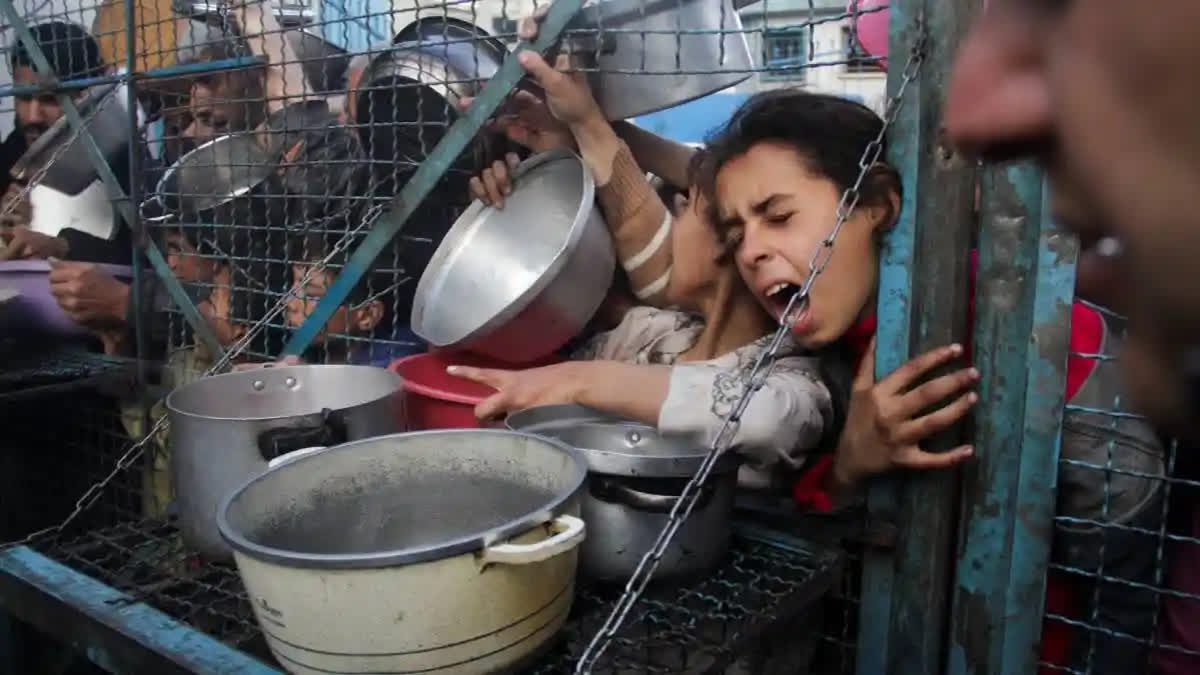Millions of people are on the brink of starvation in Gaza as they struggle to access food since Israel attacked the region after post October 7 Hamas attack. UN agencies have said famine is imminent in Northern Gaza and could occur any time up to May 2024 and the entire population of Gaza can face famine by July 2024. In a very strongly worded editorial, the medical journal The Lancet says Israel is using starvation as a "weapon of war" and asks the world to allow aid to Gaza before the entire population starves.
Ahead of World Health Day on April 7, the reputed medical journal The Lancet has written an editorial urging the world not to "use starvation as a war weapon." Calling the situation in Gaza a "stark and distressing example of how Israel is using starvation as a weapon in Gaza," Lancet quotes the UN High Commission for Human Rights Volker Turk and asks "Why is starving people to death increasingly occurring and why do countries and the UN allow it to continue?''.
According to the Famine Review Committee (FRC), of leading humanitarian agencies Gaza was above IPC Acute Food Insecurity Phase V (Catastrophe) thresholds. "The FRC's calls of a catastrophe have so far not led to sufficient aid reaching the Gazan population'' the editorial writes. FRC applies a standard five-point scale to measure hunger, as an early warning system to begin aid before people start starving.
For the famine classification to be declared, an area must have at least 20% of households facing an extreme lack of food, at least 30% of children suffering from acute malnutrition, and two people for every 10,000 dying each day due to starvation or malnutrition and disease.
According to the UN, famine is imminent in northern Gaza and could occur any time up to May 2024. Half the population--about 1.1 m people--are starving, according to the IPC classification. In the worst-case scenario, the entire population of Gaza will be in famine by July 2024.
A BBC report about famine in the month of Ramzan says "Israel's bombardment of Gaza, in response to the Hamas attacks of October 7, has destroyed food infrastructure and farmland across the territory. Aid agencies say enhanced Israeli security checks on delivery trucks have created bottlenecks around aid reaching the population."
The editorial is in sync with this year’s theme "My health, my right", underscoring the UN's assertion that “every human being is entitled to the enjoyment of the highest attainable standard of health conducive to living a life in dignity."
Lancet says that the most basic of human rights, access to food remains unattainable for 691 to 783 million people in 2022.
It further says that in "conflict zones, nearly 60 per cent of the 158 million people remain hungry."
"In conflict zones, where nearly 60% or 158 million hungry people live, the conflict has displaced population, destroyed economies and infrastructure, and led to high prices for scarce goods. Moreover, the destruction of the food supply can be deliberately used to starve people as a weapon of war, which has been more commonplace since 2010'', the editorial writes.
Lancet says Sudan is facing famine due to conflict with nearly 18 million people experiencing acute food insecurity. Similarly in Ukraine, 11 million people are hungry owing to Russia's targeting of Ukrainian ports and grain production.
The journal quotes Yemen's example when in 2014 Saudi-backed coalition effectively blocked the ports in a country. "The inevitable outcome was that by the start of 2022, the UNDP estimated that the conflict had caused more than 3,77,000 deaths, with 60% of these deaths the result of hunger, lack of health care and unsafe water,'' said the editorial.
Quoting Nobel Laureate, Amartya Sen, the editorial says, "Existing economic systems allow some people to be entitled to food while others are allowed to starve. This is often the case in conflict zones where those with means might be able to barter until food aid arrives or they can leave the conflict zone. As a result, the most vulnerable, such as pregnant and lactating women and their babies, suffer the greatest burden in terms of morbidity and mortality."
The editorial calls for more accountability during conflict situations. "But, as the International AIDS Society–Lancet Commission correctly points out, the UN Security Council inconsistently addresses and rarely enforces international human rights law in conflict settings. The reality is that geopolitical rivalries prevent collective political action to stop inhumane and illegal actions by rogue governments. As wars worsen and leave deep scars on the moral conscience of the international community, health leaders must insist on the centrality of human rights to protect vulnerable and innocent population struggling in conflict settings. The use of starvation as a weapon of war is a crime that must be prosecuted and punished to protect the most basic right of all: human dignity."
The editorial has come, along with Lancet's Commissioned report Under Threat: the International AIDS Society–Lancet Commission on Health and Human Rights, which examines the steady deterioration of the global commitment to human rights in the 21st century, with serious and increasingly damaging effects on health.
The report says sustained, strategic action is needed to halt and reverse the steady deterioration in the global commitment to human rights and to reposition human rights as a central driver of global health and political, social, economic and cultural relations.


